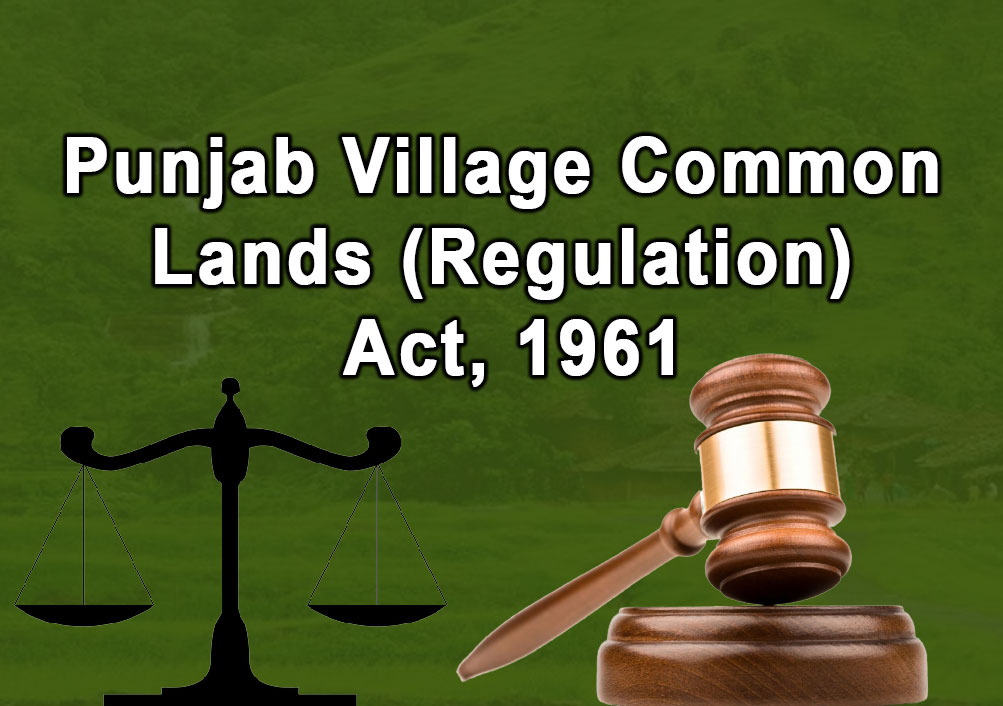First condition for case to fall in exceptions under Sec.2(g) of Punjab Village Common Lands (Regulation) Act, 1961 is that land should have been partitioned & brought under cultivation by individual landholders before Jan 26,1950:HC

Read Order: Rattan Singh @ Ratna deceased through LRs and others v. Dhoopa deceased through his LRs and others
Tulip Kanth
Chandigarh, September 16, 2021: While dismissing a Writ Petition pertaining to the Punjab Village Common Lands (Regulation) Act, 1961, the Punjab and Haryana High Court has referred to Section 2(g) and clarified that for a case to fall in the exceptions the first condition is that the land should have been partitioned and brought under cultivation by the individual landholders before January 26,1950, as provided in Clause (iii).
This Writ Petition was filed challenging the orders passed by the Financial Commissioner, Haryana, in the revision petition which was preferred by the petitioners dismissing the same as also the orders passed by the Collector, Sonipat, dismissing the application which had been preferred by the petitioners under Section 13-A of the 1961 Act (as applicable to the State of Haryana) and the order passed by the Commissioner, Rohtak Division, Rohtak, where appeal preferred by the petitioners had been dismissed.
The counsel for the petitioner vehemently contended that the authorities had failed to appreciate that as per the provisions of Section 2(g) of the 1961 Act the case of the petitioners would fall under the exceptions as contained in Clauses (iii) and (viii) and of Section 2(g).
On this basis it was argued that the petitioners should have been declared the owners of the land and the gram panchayat could not be said to be the owner as the land would not fall in the definition of ‘shamlat deh’.
For asserting this it was contended that as per the jamabandis which were placed on record for the years 1938-39, 1942-43, 1950-51, 1958-59 and 1963-64 where the land had been recorded as ‘shamlat thola’ in the column of ownership and it was mentioned as ‘khud kasht maqbooja malkan’ in the column of possession.
It was also argued that the land being in the cultivating possession of the land owners and the remarks column clearly indicated that the land was through inheritance, the case of the petitioners would fall in the exception as contained in Clauses (iii) and (viii) of Section 2(g) of the 1961 Act. It was also mentioned that the impugned orders passed by the revenue authorities could not be sustained and deserved to be set aside and declaration be issued that the petitioners are the owners in possession of the said land.
The Division Bench of Justice Augustine George Masih and Justice Ashok Kumar Verma referred to Section 2(g) and opined that for a case to fall in the exceptions the first condition is that the land should have been partitioned and brought under cultivation by the individual landholders before January 26, 1950, as provided in Clause (iii).
According to the Bench, it was not the case of the petitioners that the land had been partitioned. As per even Clause (viii), the land revenue record indicated that the individuals were not in cultivating possession rather it was a joint possession of all the land owners which had been shown.
The Court was of the opinion that it was an admitted position that the entries in the jamabandis for the year 1938-39 onwards till the year 1963-64 stood repeated where the land in question has been recorded as ‘shamlat thola’ in the column of ownership and ‘khud kasht maqbooja malkan’ has been mentioned in the column of possession.
It was also not a disputed fact that the petitioners had not been shown to be the individual owners in possession of the land in question. Another aspect which needed to be taken note of was that the land has been recorded to be ‘banjar kadeem’ which continues till date. If that be so, it couldnot be said that the land does not fall within the definition of ‘shamlat deh’ as provided under Section 2(g) of the 1961 Act, added the Bench.
Thus, the Court found no illegality in the orders impugned passed by the revenue authorities calling for interference by this Court in exercise of writ jurisdiction.
Sign up for our weekly newsletter to stay up to date on our product, events featured blog, special offer and all of the exciting things that take place here at Legitquest.




Add a Comment